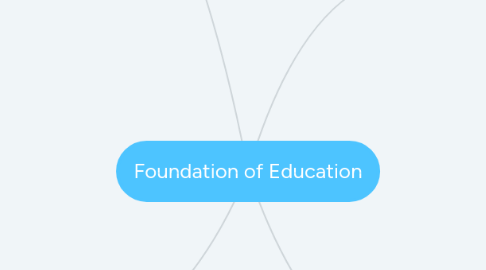
1. Sociology of Education
1.1. Theoretical Perspectives
1.1.1. Functionalism
1.1.1.1. Education is a critical importance in creating the moral unity necessary for social cohesion and harmony.
1.1.2. Conflict Theory
1.1.2.1. Schools are a social battlefield, where students struggle against teachers and others.
1.1.3. Interactionalism
1.1.3.1. One must view the students and see the reactions of them to understand the social behaviors between them and the teacher and other students.
1.2. Effects of Schooling
1.2.1. Knowledge and Attitudes
1.2.1.1. Differences between schools in terms of their academic programs and policies make a difference in student learning. The better the education, the better the student.
1.2.2. Teacher Behavior
1.2.2.1. Teachers are models for students, and they will set standards for students that will directly influence the students' achievement.
1.2.3. Student Peer Groups and Alienation
1.2.3.1. Labels in schools can cause a big impact on the student. Students that are headed towards criminal activity or low-status jobs are the ones who were in rebellious groups. Nobody wants to be a nerd, and being bad is cool.
1.2.4. Education and Inequality
1.2.4.1. If a student's family is in a lower class, it effects what they think their standards and goals should be, so that they might not achieve a higher goal than someone in an upper class.
1.2.5. Gender
1.2.5.1. Girls tend to start out ahead of boys academically, but by high school, the boys end up on top. Girls have lower self esteem and do not live up to their potential. Studies show that teachers tend to show more attention to boys, whether good or bad.
2. Philosophy of Education
2.1. Pragmatism
2.1.1. Generic Notions
2.1.1.1. It rests on the notion that children were active learners, and thus required a course of study fit for their stages of development. It is all about experimental learning, and the school should reflect their community so the student can fit in socially
2.1.2. Key Researchers
2.1.2.1. John Dewey, George Sanders Pierce, William James, Frances Bacon, John Locke, Jean-Jacques Rousseau
2.1.3. Goal of Education
2.1.3.1. Schools should balance the needs of society and community on one hand and the needs of the student on the other.
2.1.4. Role of the Teacher
2.1.4.1. The teacher is in the peripheral position of the facilitator. They encourage, offer suggestions, question, and help plan courses of study.
2.1.5. Methods of Instruction
2.1.5.1. Students work independently and in groups. Students pose questions on what they want to know. Field trips and projects are necessary.
2.1.6. Curriculum
2.1.6.1. There is no fixed curriculum. It changes as the social order changes and as the students' interests and needs change.
3. Politics of Education
3.1. 4 Main Purposes of Education
3.1.1. Intellectual
3.1.1.1. purpose is to teach cognitive skills, transmit specific knowledge, and help students acquire higher order thinking skills.
3.1.2. Political
3.1.2.1. purpose is to prepare citizens who will participate in this political order, and teach the basic laws of society.
3.1.3. Social
3.1.3.1. purpose is to help solve social problems, to work as one of many institutions, and to socialize children into various roles, behaviors, and values of the society.
3.1.4. Economic
3.1.4.1. purpose is to prepare students for their larger occupational roles, and to select, train, and allocate individuals into the division of labor.
3.2. Conservative Perspective
3.2.1. Role of the School
3.2.1.1. sees the role of the school as providing the necessary educational training to ensure that the most talented and hard working individuals receive the tools necessary to maximize economic and social productivity.
3.2.2. Explanation of Unequal Performance
3.2.2.1. argue that students rise and fall on their own intelligence, hard work, and initiative. If they fail, it is their own fault because they are given the opportunity to succeed.
3.2.3. Definition of Educational Problems
3.2.3.1. they believe that schools have lost their standards, authority, and values due to the liberal and radical demands for greater equality.
4. History of Education
4.1. Reform Movement
4.1.1. One of the most influential reform movements to me was between 1880 and 1920 when states were making laws to make secondary education compulsory. Now everyone gets the chance to have an education.
4.2. US Education Interpretation
4.2.1. Conservative historians believe that US education is not great. Although they agree with equality of opportunity in education, the historical pursuit of social and political objectives resulted in harm to the traditional academic goals of schooling.
